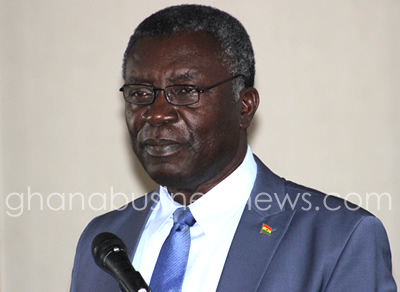We cannot end poverty without science and technology – Prof Frimpong-Boateng
 Professor Kwabena Frimpong-Boateng, the Minister of Environment, Science, Technology and Innovation (MESTI), has underscored the important role of science and technology in ending poverty in Ghana and Africa as a whole.
Professor Kwabena Frimpong-Boateng, the Minister of Environment, Science, Technology and Innovation (MESTI), has underscored the important role of science and technology in ending poverty in Ghana and Africa as a whole.
He said it was regrettable science and technology contributed to less than one per cent of Ghana’s GDP, which was very small compared to Africa’s average of 2.5 per cent, resulting in a huge gap between the continent and the rest of the world in all the scientific disciplines.
This, he said, was disappointing adding that “we cannot end poverty without science and technology; we cannot get supply of sustainable clean water and good sanitation without serious attention to science”, while the sustainable energy for all being desired would only be an illusion if strong emphasis were not laid on these scientific disciplines.
He said it was the government’s conviction to in the next four years, achieve 1.5 per cent by stimulating demand for science and technology from the private sector while establishing a merit-based research system in order to encourage and facilitate scientific research priority sectors of the economy.
Prof. Frimpong-Boateng said this in a speech read on his behalf at a durbar hosted by the Ghana Atomic Energy Commission (GAEC) in Accra, to climax the week-long activities for the commemoration of the Africa Scientific Renaissance Day, which had been on the theme: “ Promoting Science, Technology and Innovation for Sustainable National Development”.
He said although the challenges were enormous and one could easily be overwhelmed, there is the need for all scientists to shed any doubt or despair and to rise up to the necessities of the times, by challenging themselves to think solutions to the myraid of problems that bedeviled the country.
He called for a concerted effort in making science and mathematics a serious determinant for meeting the demands of the Sustainable Development Goals (SDGs), saying all advanced countries, have achieved economic growth and improvement in their standard of living, through Science and technology.
However the reality of a vicious cycle of deprivation, lower incomes, and excessive importation of foreign goods continues to rob African countries of similar advancements using these tools, he said.
Prof. Frimpong-Boateng said the programme, which was being organised under the auspices of MESTI, as an annual event initiated by the then Organisation of African Unity, now the African Union in 1987, was to recognise the great contribution of scientists in the region, to current development in these scientific disciplines.
It also offered African countries the opportunity to take a retrospective view of their unique situation, and assess science and technology in the context of sustainable national development.
There is the urgent need to address the anomaly through the advancement of policies, improved educational and attitudinal change approaches, and increased investment.
He said government intended to strengthen the collaboration among industries, universities and research centres to promote the commercialisation of scientific research outputs, while forming partnerships with local and international institutions to establish Centres of Excellence across the country that networked all higher education and research institutions.
“We want to step up our efforts at achieving 60:40 Science-Humanities student ratio by expanding Science, Technology, Engineering and Mathematics scholarship schemes”, he said.
Prof. Frimpong-Boateng said the Ministry’s collaboration with GAEC had also made huge strides by establishing the Ghana Space Science and Technology Institute, for spatial research and training, to enhance agriculture, water resources, urban development, mineral prospecting, environment, drought and flood forecasting, ocean resources and disaster management.
Again the progress being made so far by GAEC and its affiliated institute to develop a comprehensive Nuclear Power Programme that would eventually lead to cheap and sustainable electricity generation into Ghana’s energy mix, a stable tariff regime, boost industry performance, and job creation would deepen science and technology by the development of high Tech industries.
He urged all the research institutions including GAEC and the Council for Scientific and Industrial Research (CSIR), to foster collaboration at institute levels to maximise their outputs.
Prof. Benjamin Jabez B.Nyarko, the Director-General of GAEC, whose address was also read on his behalf, said without doubt, the African had huge potential and could emerge from the “dark continent” tag and shed off the old ways of doing things that has yielded no significant results.
He said that it is gratifying that the government has recognised the enormity of the situation and renewed its commitment to support science and technology’s increase to GDP growth.
He urged the research institutions to facilitate networking and co-operation, strengthen links between science and technology, and increase returns on investments in these disciplines.
Source: GNA
